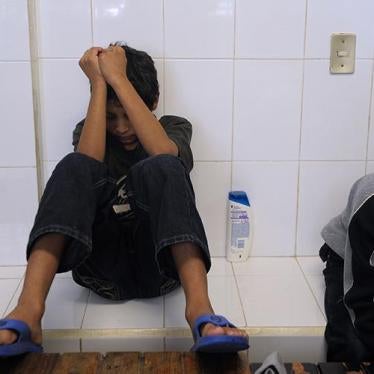(New York) – A Ugandan court’s decision to drop terrorism charges against prominent Kenyan human rights defender Al-Amin Kimathi is a welcome step, but the rights of other suspects in the July 2010 Kampala bombings continue to be violated, Human Rights Watch said today.
Kimathi was discharged by the court in a pre-trial hearing today, along with four other defendants – Ismail Walusimbi and Dr. Ismail Kalule, both Ugandans; Khalif Abdi Muhammed, a Somali; and Muhammed Abdow Adan, a Kenyan.
Kimathi is the executive director of the Muslim Human Rights Forum, a Kenyan civil society organization that monitors human rights abuses committed during counterterrorism operations throughout eastern Africa. He was arrested on September 15, 2010, in Uganda, where he had traveled to observe court hearings of Kenyan suspects in the Kampala bombings who had been illegally transferred to Uganda, without respect for extradition procedures.
Kimathi was charged with terrorism under Uganda’s Anti-terrorism Act, as well as murder and attempted murder, and was held in pre-trial detention for nearly a year. During this time, the Ugandan authorities failed to disclose the full evidence against him and the other defendants.
Fourteen others, including several of the Kenyans who were extradited illegally, remain in custody, with their trial scheduled to begin on September 19; the evidence against them has yet to be disclosed.
“The Ugandan court has shown great sense in dropping terrorism charges against Kimathi,” said Rona Peligal, deputy director of the Africa division at Human Rights Watch. “The rights of the other suspects, many of whom still do not have legal representation, must not be forgotten as their case proceeds to trial.”
The July 11, 2010, bombings killed 76 people who were watching the World Cup finals at two public venues in Kampala. The Somali militant group al-Shabaab claimed responsibility for the attacks. In August, eight suspects were rendered from Kenya to Uganda and another later was similarly treated. Following a lawsuit filed by the wife of one of the Kenyan suspects, a Kenyan court ruled that the renditions were illegal and in violation of the suspects’ fundamental rights and liberties. Their ongoing detention, in the absence of evidence disclosed against them, raises concerns about their right to a fair trial as guaranteed by the International Covenant on Civil and Political Rights.
In other cases, eastern African countries have used the specter of terrorism to restrict rights and repress freedom of expression. In April 2011, four Kenyan activists were denied entry into Uganda, where they were to meet with a judicial official concerning Kimathi’s case; one of them, Samwel Mohochi, has filed a suit before the East African Court of Justice, charging Uganda with violating the guarantees of free movement and non-discrimination found within the treaty establishing the East African Community.
In May, Kenya expelled human rights activist Clara Gutteridge, a researcher with the Open Society Justice Initiative. Kenyan Immigration Minister Otieno Kajwang told Parliament that Gutteridge, a British citizen, was “involved in subversive activities which were a threat to national security,” and “involv[ed] with known terrorist operatives and al-Shabaab.” Kajwang further said Gutteridge was “found in possession of materials related to al-Shabaab,” and falsely claimed she was traveling on two passports. Gutteridge’s alleged “subversive activities” seemed to consist of her investigations of abuses committed by eastern African governments in the context of counterterrorism operations. The documents found on Gutteridge consisted of legal briefs related to the arbitrary detention and rendition of several terror suspects.
In Ethiopia, terrorism charges are also being used to silence critics and restrict freedom of expression and due process rights. At least four journalists were charged under the country’s restrictive anti-terrorism law in separate cases on September 6, 2011 after several months of remand detention.
“Across eastern Africa, governments are all too willing to resort to ‘terrorism’ accusations to silence their critics,” said Peligal. “We are pleased that the Ugandans have recognized the arbitrary nature of the detention of human rights defender Al-Amin Kimathi, and encourage other governments throughout the region, including Kenya and Ethiopia, to ensure that terrorism charges do not become a guise to violate the rights of citizens.”






